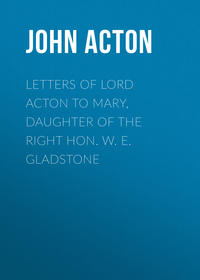Letters of Lord Acton to Mary, Daughter of the Right Hon. W. E. Gladstone

Полная версия
Добавить В библиотекуАвторизуйтесь, чтобы добавить
Добавить отзывДобавить цитату
Letters of Lord Acton to Mary, Daughter of the Right Hon. W. E. Gladstone
Авторизация